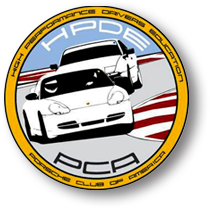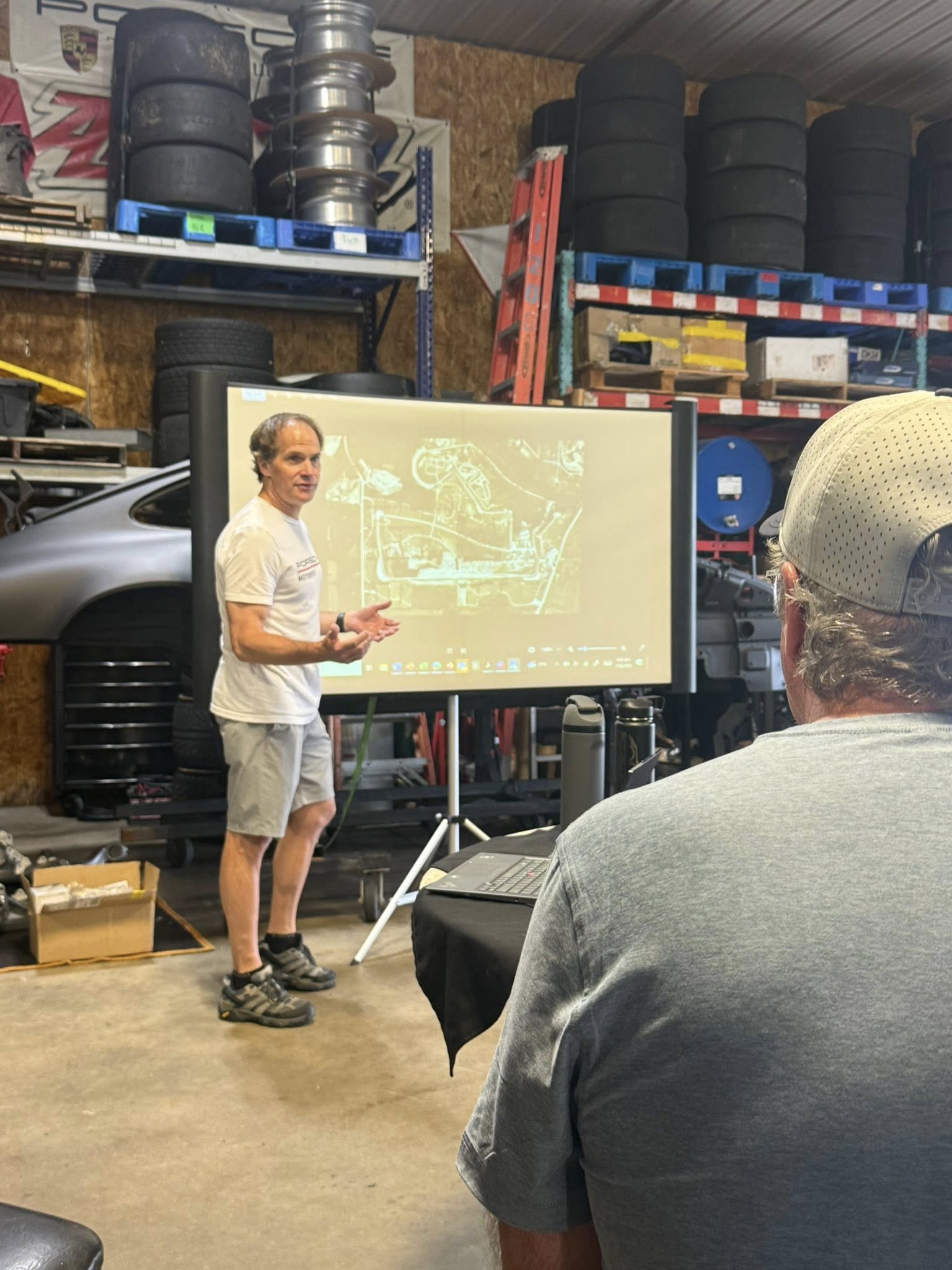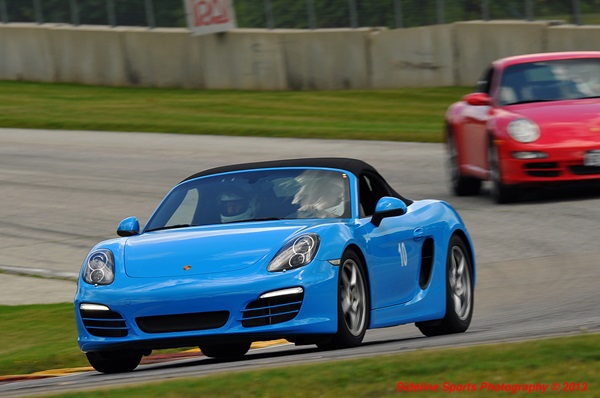Driver Education

The mission and purpose of the High Performance Driver Education Program is to provide a safe, structured and controlled teaching and learning environment. The PCA DE program is designed so the participant can improve his or her driving abilities and acquire a better understanding of vehicle dynamics and driving safety at various tracks around the country. The Milwaukee Region is fortunate to have two tracks nearby -- the legendary Road America four-mile course near Elkhart Lake, Wis., and Blackhawk Farms, near South Beloit, Ill.
Check out this video on how to drive the Road America 14-turn road course. We also have an article that traces the history of Elkhart Lake and Road America.
Please contact the DE committee via e-mail at MilwaukeeDE@gmail.com with questions about driver education.
Items required to participate in the Milwaukee Region DE events:
-
Helmets: Read our fact sheet about helmets here.
-
For SA2015 helmets, the expiration date has been extended to June 30, 2026, to allow the manufacturers time to get their SA2025 product into the supply chain.
Effective July 1, 2026, Snell SA2015 helmets will no longer be permitted.
- The SA2020 helmets will only be valid for five years, through 2030.
-
- Drivers license
- Technical Inspection Form.https://www.porschepark.org/files/cms/0/433-1743250761.pdf
Run group novice and intermediate must take this form to your mechanic of choice and have the form completed there. See the listing of shops and dealers where you can take your car for the tech inspection. Then bring to the event.
Advanced drivers should complete the form and bring it to the event. Download here: https://www.porschepark.org/files/cms/0/433-1743250761.pdf - Emergency Contact Form. Extra forms are available at the registration table.
Various color-coded wristbands will be applied to you at registration serving as approval for you to drive per your assigned run group.
Technical Inspection: Every car in groups I & II must be inspected at the track. Group III is optional. Technical Inspection will close 15 minutes before the mandatory drivers meeting. See the schedule for time and location. Bring the Technical Inspection form that was completed by your shop of choice and empty all personal contents from your car. Open hood & truck lids; remain with your car.
Drivers' Meeting (Mandatory): You need to also attend the drivers' meeting. If you don't attend you will not drive. See the schedule for time and location.
Instructors Meeting (Mandatory): All instructors are required to attend. See the schedule for time and location.
Novice Meeting (Mandatory): All novices are required to attend. See the schedule for time and location.
Car Numbers: Your car must have your assigned car number in three (3)locations before entering the track:
- Upper passenger side windshield or center of hood
- Left & right-side doors or side rear quarter windows
Note: Numbers needs to be at least 8 inches tall and easy to read from 30 feet away (white on glass or contrasting colors on metal). Shoe polish works on glass, decals on metal, plus our club sells sets of three (3) high quality magnetic numbers for $50. You need to request them at the time of registration or you may purchase them at the track on a first come basis. Shoe polish may smear in the rain, and it's advised that you tape the leading edge of any magnetic numbers to avoid high speed blow-off.
Passing rules: Pull offline to the right, decrease speed, signal with left hand extending out the driver side window one time for each car to pass (extend hand car #1 passes, retract hand and extend again for car #2), let car pass, return to driving line. Passing Areas ONLY between turns as designated on the track map. All passing should be completed so passing cars are back on line well ahead of the braking zone. Violators will be shown the black flag and dealt with on a case by case basis. Violators may be dismissed.
Spin Rule: 4 wheels off the track or an on-track spin, proceed to pit lane and meet with DE official. Violators may be dismissed.
Run Group Assignments: Note: Stay within your designated run group all day. If, and only if, you feel there is a gross group misclassification you can't live with, please request a run group change before the event. Everyone will get plenty of track time.
Group I: Drivers with limited road course experience, experience with smaller tracks only or lower H.P. cars.
Group II: Drivers with intermediate experience (above group I, but less than Group III qualifications)
Group III: Significant large road course experience, both street legal cars and non-street legal race cars.
Vehicle Safety Inspection: Since we only have a short time for registration in the morning, it is important to have your car thoroughly inspected prior to the event per the Technical Inspection Form. You will be putting stress on your car and yourself! We strongly urge you to have it inspected by whoever services your car. We'll provide some cursory on-site inspections but it's your responsibility to ensure your car is track worthy before arrival. If it's not, you will not drive. Safety is paramount.
Parking Restrictions: Do not park in fire lanes or non-traditional parking spaces (peripheral grass spots). Do not under any circumstances park under overhangs, in building or structures, fire lanes or on weight scales unless willing to chance a $500 fine. Any and all pets must be leashed, and no open-fires are allowed per the track contract.
Noise Limit in Effect: A 103-decibel noise limit restriction will be in effect at all times as measured 50 feet from track paving.
Track Food: Typically there will be a concession stand open during the events. You will be notified via the registration confirmation should they be closed.
Waivers: All registrants, guests, family and friends are required to sign the waiver whether driving or not. Neither the club nor track owner's insurance covers collision damage to your car... you assume the risk.
Zero-Tolerance Alcohol/Illegal Drug Policy: No drugs or alcohol is allowed on premises by anybody; leave it at home or find the exit gate.
No Fun Rides: Without exception, passengers will not be permitted in cars on the track during D.E. unless they are either registered instructors or students.
Open Cars - Blackhawk Farms Raceway:
- To be eligible for the event open top cars must have SCCA or other race-series-approved roll cages. All open top cars must be equipped with race seats and 5- or 6-point harness systems for both the driver and passenger. All drivers and passengers in open top car must wear arm restraints.
Open Cars - Road America:
- Any make of car installed with factory rollover protection meets the minimum standards for PCA DE events at Road America. In these cars the soft top must be in the up position or the hard top installed and passes the "broom stick" test. See next bullet for definition of "broom stick" test.
- If a car does not have factory-installed rollover protection, a roll bar must be installed, which meets the "broom stick" test rule: the driver's helmeted head is below a bar placed on top of the roll bar and windshield. All targa tops must be installed unless there is additional rollover protection. All sunroofs must be in the closed position. The windshield alone is not considered to be factory rollover protection.
- Any open top car without a roof must have a roll bar installed that passes the broom stick test and the driver must have arm restraints.
Harness/Seat Belt: Please review this update about this important equipment.
- Group I-II: 3-pt stock seat belt. 4-pt harness with application tags applicable to car (Porsches are not allowed to have 4-pt harness), 5-pt/6-pt with race or sport seat with applicable slots through the seat back and bottom seat.
- Group III: 5-pt/6-pt. harness or better is mandatory with race seat
- All shoulder harness attached to roll or harness bar with the exception of 914s.
- Occupied passenger seat needs equivalent system or better.
Clothing: Driving suit or long sleeve cotton shirt, long pants, socks, closed toe shoes. All non-synthetic clothing.
Drivers Window: Driver window must remain fully down during sessions, passenger window either fully up or fully down. If a passenger is present then the window must remain down. No arms leaning on window sills.
Spectators/Viewing: Roaming woods areas is explicitly off-limits. Use normal public view areas only.
Track Damage: "You hit it, you bought it" rule in effect i.e. guardrails, fencing, building, signage, etc.
Pit lane: Cars entering and exiting the track are to do so ONLY through pit lane...entry speed into pit lane should not exceed 15 mph; conversely, exit speed from pit lane should be brisk, performed by staying clearly to the right of the entry line while carefully watching mirrors for fast traffic behind. There is a Hot Pit and a Cold Pit. Know where they are and how to use them.
Novices: Novices must drive with their assigned instructor during the entire event unless the instructor signs you off and obtains additional approval by the PCA DE chairperson in writing using the Novice Evaluation Form. Novice drivers should drive at their own ability level. Be patient, listen, learn and above all ask questions. Car owners will assume all risk for damage to their vehicle while at the track, regardless of who is driving said vehicle.
Instructors: We commonly induct experienced drivers to act as instructors for our events.
Safe Following Distances: Maintain reasonable distance between yourself and other cars at all times. Bunching up on straights creates a safety hazard at the next corner. Ideally, keep at least a minimum of a three car distance on straights. Violators may be black flagged or asked to leave. Drafting into braking zones will not be tolerated under any circumstances, remember, this is not racing. Off-track Excursions: If it appears you're headed off-track, it's critical you drive off in a straight line, attempting to slowly turn the car back to get back on track generally results in catastrophe, putting you and others at risk. Your plan should be to smoothly bring the car to a complete stop in a straight line and wait for a corner worker to signal it is safe to get back on track. "In A Spin - Both Feet In."
Insurance and Waivers: All entrants (participants, drivers, corner workers, EMTs, gate workers, guests, etc.) to the track are required to sign a waiver/release form, which releases the Porsche Club of America, its national and regional officers and members, car owners, stewards, drivers, participants, owners and lessees of the premises, etc. If, for example, a driver loses control of his car and were to hit a corner worker, your release explicitly and implicitly affirms you won't hold either a driver, P.C.A., track owners, or event organizers responsible for any injuries. The Porsche Club purchases liability insurance coverage (covers participants, spectators and workers) on this event as follows: $10,000,000 Comprehensive General Liability, $5,000,000 Combined Single Limit Liability applicable to bodily injury for participants Indemnification: You'll find this term in most motorsports waivers/releases...what this term means is that not only is the signer releasing all parties mentioned above from liability or wrongdoing, but also that if somebody who signed the waiver decided to sue PCA or its organizers, that they have agreed to indemnify (agree to pay for all parties legal fees) those who they sue. Negligence: You see the term a lot in today's world. Contrary to what some attorneys may have you believing, somebody is not necessarily negligent should an accident occur. However, if negligence has occurred, the release says that in the event a participant is injured due to someone else's negligence, the injured party fully releases any and all claims based on negligence against that negligent party. In essence what we're saying is that this isn't bowling or tennis. Certain inherent risks exist and entrants must be prepared to assume full responsibility. We can't guarantee "zero-risk," we merely attempt to limit your exposure by using formal rules and enforcing them. Your attitude is also key.
PCA Insurance Requirement: This is a driver's education event, NOT A RACE; as such, racing in any form will not be allowed; violators are subject to expulsion without refund. All decisions are final. Let's all have fun, get an education and use common sense. Drivers are urged to drive well within their abilities and comfort zones. If you're anxious or tired, pit early. Take a break. Don't jeopardize others, as most participants need their car in once piece to get home. Your behavior is fundamental to making this a safe, educational and fruitful day.
Flag Identification/Corner Worker Instructions: We staff our corner safety stations with professionally trained SCCA corner workers and EMTs, who are in continuous radio contact with pit control. The use of colored flags at corner stations and pit control are our sole means of communication to drivers. Thus it's paramount to everyone's safety that you're familiar with what they mean and respond courteously and appropriately. The track has backup radios in the event of radio failure. The Event Chair/Co-Chairs will control ALL order, activity and safety (including accidents), as well as make all official statements regarding incidents or accidents. New lines of authority cannot be instituted which subordinate that authority.
Corner Workers and Flags: Corner workers are not legally obligated to risk their own safety in an accident situation, and you can expect that their safety must come first and foremost over that of any driver.
Flags:
- Green: Go, session under way, track is clear
- Yellow-Stationary: Used for warm up and cool down laps, or to communicate, no passing under yellow. Proceed with caution until all flags have been removed. Drivers are obliged to observe and honor all communications from corner workers.
- Yellow-Waving: Briskly waved flags indicate more serious conditions requiring greater driver caution, such as track debris, fluid, spinouts, animals on the track, etc.
- Yellow w/Red Stripe: Oil or debris on track. Slow down. Slippery or hazardous conditions.
- Blue w/Yellow Diagonal Stripe: Allow faster car(s) behind you to pass as soon as safe to do so.
- Black (Pointed at you): Pit immediately and report to the Pit Control Steward.
- Black (All corners waiving): Session over, all cars proceed to pit lane.
- Black Flag w/Orange Ball (Meatball) Road America Only: Displayed at Turn #14, indicates a mechanical problem and you should proceed slowly into the Hot Pits and report to Pit Control Steward.
- Red (All corners waiving): Come to a controlled stop off line and wait for further instruction.
- Checkered: Displayed only at the Start/Finish line, it signals the end of the session and start of cool down. Reduce speed to let car cool and do not pass. At Road America exit at turn 5; at Blackhawk exit at pit lane.
At all corners, traffic will be monitored both entering and exiting each station...as corner exits are where the majority of spins occur, special attention will be given to them. In the event of an accident, under no circumstances should you stop your car near the accident to help. That's the professional corner worker's job.
Accidents/Injuries: Absolutely no statements are to be made by anyone present to the press or law enforcement officers without express consent of the event chairman; in an incident, the chairman and track management will be responsible for compiling witness names, filing incident reports and providing information to law enforcement as circumstances require.
Fires (Rarely occur, but be prepared) - "Stop, Think, React."
Drivers: Should a driver be on fire, the old adage "STOP, DROP & ROLL" still applies; water helps, but unless absolutely necessary. Only if deemed necessary will someone spray a driver with a dry chemical extinguisher, as the dry chemical turns into hydrochloric acid when breathed into the lungs, and can possibly result in severe respiratory problems. Cars: If a car has gone off course, the dry grasses may easily be ignited by catalytic converters and other hot engine or exhaust components. Corner workers will be prepared with extinguishers near off-course vehicles. Providing there was no impact and the driver is ok, guard the car against a fire by staying nearby until it can be safely removed from ignitable areas. TIME IS OF THE ESSENCE... EXTINGUISHERS WILL BE USED EARLY AND LIBERALLY.
Web sites:
Blackhawk Farms Raceway
Road America
Milwaukee Region site
If you have questions or would like more information, please contact Milwaukee DE committee via e-mail at MilwaukeeDE@gmail.com.
Forms
- DE tech inspection form
- Emergency Contact Form
- Expense reimbursement
- Minor waiver for touring laps
- Release and Waiver of Liability form
Media
Upcoming Events
Related Journal Articles
- Fact Sheet about Helmets [Oct 1]
- Helmet standard revised [Oct 1]
- From Street to Track: A Beginner’s Guide to High Performance Driving [Mar 5]
- History of Elkhart Lake and Road America [Apr 1, 2022]
- Special interest license plate features Road America [Oct 2, 2021]
- How to drive Road America [May 8, 2019]
- How to drive the 14-turn Road America course [Nov 14, 2018]
- Helmet measurement [Mar 4, 2017]
- Kohler racing video [Nov 24, 2015]
- Road America DE day in pictures [Sep 12, 2014]
- more...


Images provided by Mike Wiviott and Sideline Sports
